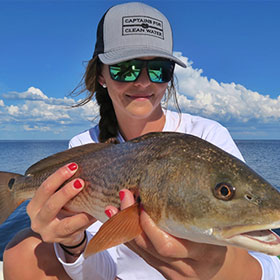Catching Dangerous Fish and How to Handle With Care
By Alycia Downs
Feb 06, 2019
Learn safety tips for catching dangerous fish and a few common species to look out for.
Catching dangerous fish can be an intentional feat for thrill-seekers, but any angler could find an unwelcome species at the end of their line. Dangerous fish to catch might be large in size, have sharp teeth, or wield venomous protrusions. Learning dangerous types of fish will help you understand how to best handle them for a safe and harmless release—for angler and fish alike. This article will cover handling tips for catching dangerous fish and a few common species to look out for.
Dangerous Fish to Catch
Sharks (obviously!). Most sharks are caught only if an angler is intentionally fishing for them and experienced with handling them. If you happen to hook up to one, enjoy the fight and catch a glimpse, but don’t try to grab them or put your hands near their mouth.
Catfish. Certain freshwater and saltwater catfish have venom glands and sharp spines on their dorsal and pectoral fins that can puncture your skin and cause pain and infection.
Alligator Gar. Their appearance is that of half fish, half alligator, characterized by their elongated mouth and rows of sharp teeth. The Alligator Gar can grow to more than 200 lbs. and are known to spit hooks due to their tough mouth.
Muskies and Pike. These similar fish are known for putting up a fight. Muskellunge and Pikes have sharp teeth and sharp gill plates that should be avoided.
Barracuda. Lively and powerful, barracudas have a mouthful of sharp teeth and are known to jump out of the water. These fish are aggressive predators so handle with caution.
Lionfish. An invasive species with numerous long, venomous spines, lionfish are fairly docile, but should not be handled with bare hands.
Catching Dangerous Fish: Safety & Handling Tips
- Never put your hands near the mouth of a fish with sharp teeth or try to remove the hook with your hands.
- Don’t attempt to pull large fish into a boat without a professional. They can often flail wildly on the deck and injure bystanders.
- Wear gloves and long sleeves when handling fish with sharp spines or teeth.
- Remove hooks with a dehooker tool or long-handled pliers. When in doubt, break the line.
- Keep a first aid kit on board for minor cuts.
When renewing or purchasing a fishing license, check the state’s website for a list of potentially dangerous fish in your area, as they may offer more specific handling tips and regulations. Don’t fear the fish, just be prepared and have fun!









